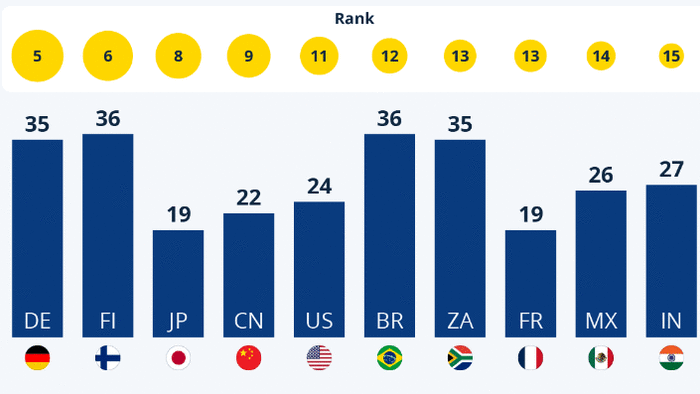Interest in politics shows significant variation across nations, as evidenced by a recent survey conducted by Statista Consumer Insights between July 2023 and June 2024. Among the 21 countries surveyed, politics ranked in the bottom half of personal interests when positioned against a total of 18 topics. In this ranking, India emerged as the least politically engaged nation, placing politics 15th, followed closely by Mexico at 14th, and both France and South Africa at 13th. This indicates an overall trend in which political interest is not as prominent among citizens in these nations compared to other personal interests. The survey underscores a continental divide in political engagement, with distinct countries exhibiting varying levels of interest in politics.
Even within countries that ranked similarly in political interest, the percentage of respondents who identified politics as a personal interest differed markedly. For instance, in France, 19% of respondents expressed an interest in politics, which secured its 13th position, while in South Africa, that same rank was attributed to a higher 35% of respondents. In contrast, the United States saw 24% of participants showing an interest in politics and current events, placing it at rank 11. Brazil and Finland led the pack, with 36% of respondents expressing political interest, demonstrating a greater affinity for the subject. However, while political interest ranked 6th in Finland, it only placed 12th in Brazil, suggesting that national contexts contribute to whether or not politics is a prominent area of interest.
The geographical distinctions in political interest can partly be attributed to the broader patterns of engagement in other topics. For instance, Brazilian respondents indicated interest in an average of seven topics, which was similar to the levels seen in South Africa, India, and Mexico. Conversely, Germans and Finns reported a more restrained interest in a narrower range of 5.4 to 5.9 topics. In contrast, French and American respondents averaged only 4.8 interests, while South Koreans and Japanese reported even fewer, at 4.1 and 3.4 interests, respectively. This demonstrates that the number of interests expressed by participants may influence how prominently politics is ranked among them.
A closer look at the more popular interests reveals that movies, music, TV, travel, health, and fitness consistently draw more attention than politics in all surveyed nations. Sports, food, and dining likewise stand out as more popular topics across almost every country. This preference strategy suggests that citizens often prioritize entertainment and lifestyle-related interests over political matters, as they may be perceived as more relevant or enjoyable. Remarkably, the only areas that tend to exhibit less interest than politics are gaming, eSports, and celebrity culture, hinting at a deeper cultural engagement with broader themes of society over the more contentious realm of political discourse.
In analyzing the regional nuances of political interest, it becomes apparent that culture, media exposure, and the political context of each country significantly shape public sentiment toward political topics. Societies with more pressing political issues or vibrant public discourses may prompt higher engagement levels from citizens. In contrast, regions experiencing political stability or less political controversy might see a gradual decline in the passion for political discussions. These trends reflect not only public sentiment but also the effectiveness of political communication channels and governmental transparency, both of which can either energize or dissuade public interest in political affairs.
Overall, the data reveals a complex landscape of political interest and engagement across various nations, highlighting the interplay between cultural preferences and political realities. While politics plays a vital role in shaping societies, it competes with a multitude of other interests that citizens prioritize, which ultimately informs the rankings displayed in the Statista survey. The survey’s findings underscore the challenge for political leaders and institutions hoping to engage a broader segment of the population in meaningful political discourse, as they must contend with the strong pull of alternative interests that captivate public attention.

